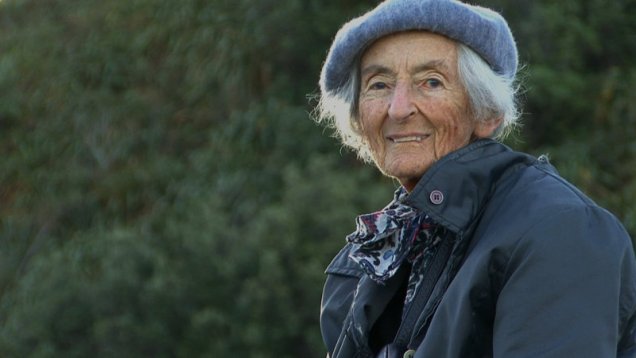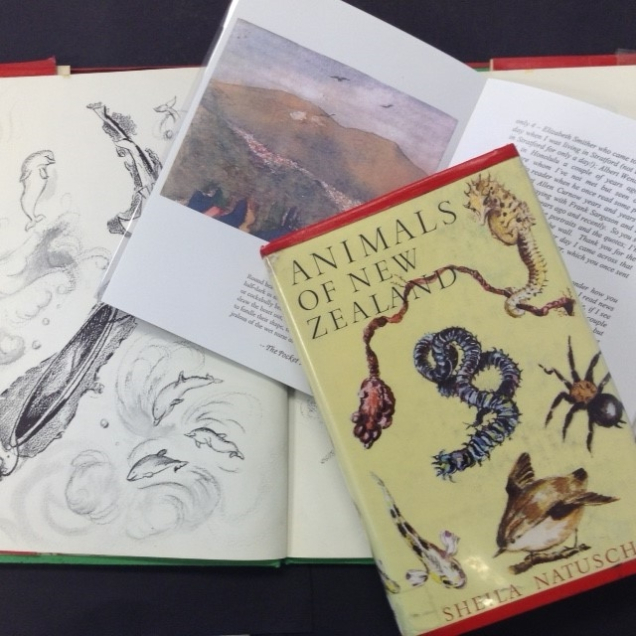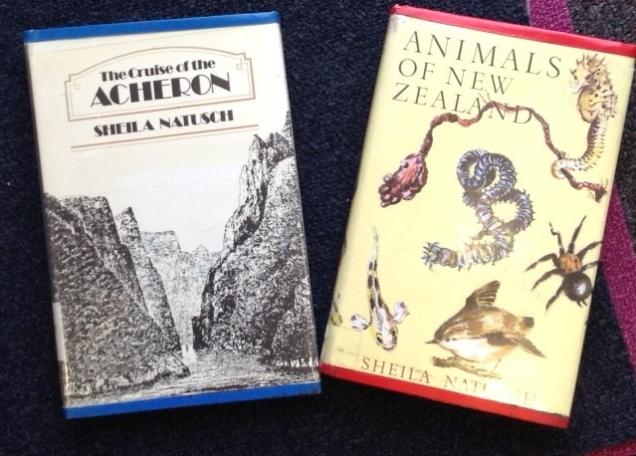"I've got books instead of babies" — these were the words of Sheila Natusch, whose cinematic portrayal is coming to the big screens in Christchurch today and tomorrow (Friday 11 and Saturday 12 August).
As the movie proves, it isn't just books that inhabit Sheila's world. It's also wonder and passion for the natural world — plants, animals and rocks. This translates into writing and beautiful illustrations. The documentary shows so much — her love for the sea and sailing, honeymoon spent in the hut under Mt. Aoraki, the fun of learning Icelandic and swimming with seals, her close and dear friendship with Janet Frame in their formative days as young writers. Got the feeling? Who needs a TV and a car if you can enjoy a night camping under the stars and a bicycle tour from Picton to Bluff?
Sheila Natusch greatly contributed to the understanding of nature by writing and illustrating Animals of New Zealand, the first comprehensive reference guide on this subject. She carried on writing all her life, on nature and history. Sheila has her artistic talent (inherited from her mother and grandmother) to accompany her words with convincing yet soft illustrations. In 2007 she was awarded New Zealand Order of Merit for her services to writing and illustration.
Watching the movie, it is not hard to see what compelled producer Christine Dann and filmmaker Hugh MacDonald (Sheila's cousin) to capture Sheila on film. With premieres rolling out in cinemas from Auckland all the way to Gore, they are both fully occupied these days, but Christine still found some time to reveal the backstory of this inspiring project.
When did the idea to make a documentary about Sheila become obvious and where did it come from?
Director Hugh Macdonald has known Sheila all his life and always wanted to make a film about her, as she is such a fascinating character, as well as a woman of great achievements. I knew about her achievements before Hugh introduced me to Sheila, and as soon as I met her knew she'd be a great film subject.
Sheila is such a cinematic character, her enthusiasm and love for life in all its forms is beaming from the screen. Her story and persona are perfect for a form of a film storytelling. What was your intention in making this documentary, besides portraying Sheila and telling her story (because it also is a film about nature, New Zealand, wonder, curiosity and passion)?
Hugh and I share Sheila's love of nature and the wild places of New Zealand. We agree with her that they are a source of much joy and inspiration. In making a film about her we wanted to share some of that joy and inspiration via someone who embodies it.
You produced the documentary but also contributed as a researcher and writer. How long did your research take, what were the main resources you used?
The research for the film took about nine months, but that was spread over 18 months in time as it involved going to Dunedin twice, down the West Coast, and to Southland and Stewart Island. My written sources included Sheila's letters to her parents in the 1940s, and to Professor Ramsey in the 1950s and 60s, plus all her published work, both books and articles. Of course I talked to Sheila a lot to check things out as needed.
Is there a funny story from behind the scenes, something that happened during filming that you could share with our readers?
There always seemed to be lots of surprises happening, mostly good ones - such as the completely unexpected delivery of a box of chilled mutton birds to Sheila's place when we just happened to be there with the camera for other reasons - and that enabled us to shoot the scene in the Bach Cafe where Sheila takes them to her friend Maraea to cook up for them all.
The visit of the Ecuadorian navy sailing ship the Guayas to Wellington in January 2016 was another such good surprise, even though we had to scramble hard to get the filming organised
Sheila made nature and science accessible to New Zealanders in a user-friendly and encouraging way, especially with the Animals of New Zealand. However, she was to an extent criticized by scientists due to a lack of scientific language in her works. Why do you think that happened?
She was writing at a time when the scientific community (especially the Royal Society) was trying to raise the status of science as a profession of experts who communicated largely with each other, rather than the general public. Sheila has always believed that knowledge about nature needs to be shared as widely as possible, and that means writing in non-technical, jargon-free and also lyrical ways.
Sheila is extraordinarily talented in so many different ways: she is an amazing self-taught illustrator as well as a writer, she has a great passion, understanding and an eye for the natural world, she is a researcher and an "outdoor pioneer-ess". And she managed - it seems like all throughout her life – to nurture and develop all those talents, which must have been quite hard in those days.
Sheila is not only very intelligent, she's also very determined, so although she was certainly knocked back and excluded from some things she wanted to do, or ways she wanted to do them, she just kept on pushing until she found a way around the obstacle.
Which is your favourite motto or a thought from Sheila's wise yet witty repertoire of thoughts?
Too hard to choose! But in the film you'll hear her say several times that you have to 'keep on keeping on' when challenges arise, and that's a good advice.
I was very delighted, when I realised that Sheila quotes Walt Whitman in her introduction to Animals of New Zealand (his poem The beasts, which talks about the animals). I wonder if she ever in your conversations revealed her fondness for any other authors and who were they?
She has a big library of books on ships and sailing, and likes novels and poems about the sea and life on it. She can remember a lot of songs and poems from her early years with a sea theme, such as John Masefield's Cargoes. She's pretty good on Shakespeare as well.
Is there anything else you would like to share with our readers about Sheila and your movie?
It has been very rewarding for Hugh and me to share our enjoyment of Sheila, and her enjoyment of life, through this film, and find that is (as we hoped) resonating deeply with other people.
Sheila's story told through the camera lens is full of curiosity and wonder for nature and great outdoors that surround us. It proves that those who observe and see, will be rewarded greatly - with life-long beauty and content. Make sure you see it!
Find out more
- Secure your seat for No ordinary Sheila screening on Friday or Saturday
- Explore the books by Sheila Natusch in our collection
- Listen to Sheila talking to Kim Hill on RNZ
- Hear Christine Dann on RNZ talking about the making of the movie
- Read:
- Sheila's story on Hugh McDonald's web site
- Force of Nature a profile in the University of Otago magazine
- Check out Christine's and Hugh's web pages
- See what else is on at the New Zealand International Film Festival







Add a comment to: Producer Christine Dann talks about No ordinary Sheila, a documentary about an inspiring woman and the power of wonder